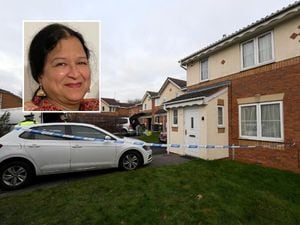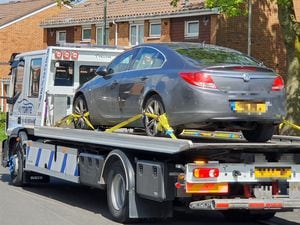Progress Towards A Safer Staffordshire
The end of 2012 was a fascinating time to become involved with policing, the justice system and community safety. The impact of less money was really biting and some commentators predicted that policing across the country would be 'financially unsustainable' by 2016.

I don't agree… or at least it doesn't have to be the case if money is spent more effectively through the public sector working more collaboratively to deal with the causes of crime and social ills... not simply the effects. It requires a fundamental and brave change of mindset but is worth trying to do because it would result in further reductions in crime, big financial savings and better services. Easy to say, I know, but less easy to actually achieve. But that is, and will remain, our ambition.
It takes a multitude of public agencies and others to help make Staffordshire and Stoke-on-Trent safer. Whilst policing plays a big part, the police cannot do it on their own. It needs the whole public sector, businesses and charities, as well as all of us… the people of Staffordshire.
Improving joint working and dealing with things that potentially cause harm earlier is at the heart of the strategy I published last year. Delivering that strategy is the focus for the small group of professionals I brought together in 2013 to replace the old Police Authority. I went for a broader scope of expertise in my office than most PCCs have because I wanted the ability to drive the complex changes needed for the future rather than simply monitoring what's happening.
If we are successful, and I can see progress already, it will be good for the short term and the longer term. As a society we broadly 'reap what we sow' but too often public services are so busy dealing with today's issues they forget about trying to prevent tomorrow's problems. Let me explain. A child growing up today in a family where drugs and alcohol are part of daily life is likely to adopt those same traits in their adult life. It can lead to crime and violence, absence of any work ethic, even a lack of the basic principles of right and wrong over generations.
But often there are opportunities to disrupt that cycle of decline and dysfunctional behaviour which affects the rest of us and damages our society's long term prospects. It requires a coordinated effort from different agencies working effectively together as early as possible to tackle the causes. Early Intervention is an absolute priority for the team I've brought together. Success will reduce future demand for services, make our communities safer and save hundreds of millions of pounds of public money over the next decade.
There's also societal change, which is more difficult to influence. The Internet means that being defrauded online is more likely than being mugged in the street. Social media and the endless ways of communicating means there are now new risks to youngsters and vulnerable people. The threat of extremism and terrorism is evolving, as are risks from organised criminal gangs. And society's more prevalent use of alcohol or drugs leads to more incidents of theft or violence. I don't make these points to alarm, but to explain the complexities facing policing, security services and wider public services.
My first Annual Report highlights some key issues, what's going well and what's not. I think it gets to the heart of why the Police and Crime Commissioner (PCC) role is unique. A democratic mandate to influence the wider landscape, beyond just policing, has never existed before. A whole system view of how to make our places and people safer, rather than just bits of it, is potentially a game changer.
For example, the Intelligent Justice work we've been doing with the Police, Crown Prosecution Service and Courts has improved processes in the criminal justice system. It has resulted in unprecedented improvements in performance with convictions up, less wasted Court time and better quality justice. It's also meant better value for money, all in just six months. Additional work aligned to all that will lead to fewer postponements of hearings, offenders getting to Court faster and less trauma and inconvenience for victims and witnesses. It's working across that whole system which is making the difference.
The Safer Fairer United Communities Strategy I published last year called for that more joined up approach. It recognises that effective partnership working is very difficult because it requires sharing power, responsibility and budgets instead of working in silos. Most challenging in the public sector is a willingness to combine budgets around a theme such as Offending or Domestic Violence… but that is crucial. Collaborative working and being brave enough to bring different pots of money together is not the answer in itself but doing that effectively ensures clear and shared ambitions, less wasted effort, better value for money and almost always better results much faster.
The financial challenges faced by public services can be tackled in distinctly different ways. One is to make the area that services cover bigger. Regionalisation might appear to be cheaper but every day I find that the further away governance and decision making is from service delivery, the more inefficiencies and waste there is. It makes them more remote and less relevant to local people and reduces the ability to target a different approach to different areas with differing needs. It is the stack 'em high and sell 'em cheap option to public services… an easy quick win option which I think is flawed.
In my view, a more effective and sustainable answer is a properly integrated system where services work towards common outcomes in a similar way. Staffordshire and Stoke-on-Trent is big enough, with a population well over a million, to achieve some economies of scale but small enough to make that whole system approach work. It's about optimum size. Big enough for some scale but small enough for targeted local services that fit the needs of different areas within it. That local approach, but joined up across a system, would reduce future demand for services, save more money and also result in much greater socially valuable outcomes. We're 'dipping our toe in the water' by starting to pool money across services around themes as I mentioned earlier. Governance and management of services closer to delivery would mean better value for money, reduced future demand and positive social impact.
The overall strategy is critical but as PCC I also have a specific legal responsibility to ensure the effective and efficient policing of Staffordshire so I'll finish with some thoughts around Staffordshire Police. The last three years has seen Government funding reduce substantially and there are even bigger reductions to come. The police have done a tremendous job in difficult times but sustaining quality policing has become more difficult year on year and managing finances mainly, but not exclusively, by cutting police officers and staff is not sustainable.
That's why perhaps the most immediate success of the last year and a bit has been working with the police to get finances back on track by buying better, changing the way some support services are delivered and generally having a laser focus on good housekeeping. The good working relationship between my team and the Chief Constable's has been pivotal in this turnaround. Even I am a little surprised at the strength of finances now up to 2020. It's no walk in the park and there are still challenges ahead but achieving it has helped in more ways than just the budget. It's created a little more space to think longer term about added value, better services and developing new ideas rather than simply trying to survive from one day to the next.
It means more focus on the quality agenda which is about reform where it's needed, freeing up police from bureaucracy or target chasing and getting officers back into more communities for more of the time. I also want to see improvements in the way police interact and engage with their local communities so we're working on establishing new standards of good old fashioned customer care as well as putting in place new public groups to act as local sounding boards for police commanders in each area of Staffordshire. I am delighted that Staffordshire is being recognised nationally as well as on the way to meeting our ambition of having the most open and transparent police service in the country.
I firmly believe that it's not only how much money is provided for public services but how well it's spent. As each day, week and month goes by, collective ambition is growing and new ways of thinking are starting to take hold, not just in policing, but wider. It's a genuine and unique chance to step up for the people who live here to secure a safer, fairer, united future for our communities. It also means exciting times and opportunities are ahead.
The full 'Progress Towards A Safer Staffordshire' annual report can be read here.





